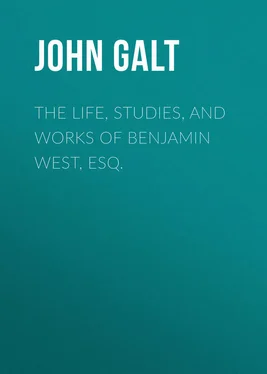John Galt - The Life, Studies, and Works of Benjamin West, Esq.
Здесь есть возможность читать онлайн «John Galt - The Life, Studies, and Works of Benjamin West, Esq.» — ознакомительный отрывок электронной книги совершенно бесплатно, а после прочтения отрывка купить полную версию. В некоторых случаях можно слушать аудио, скачать через торрент в формате fb2 и присутствует краткое содержание. Жанр: foreign_antique, foreign_prose, на английском языке. Описание произведения, (предисловие) а так же отзывы посетителей доступны на портале библиотеки ЛибКат.
- Название:The Life, Studies, and Works of Benjamin West, Esq.
- Автор:
- Жанр:
- Год:неизвестен
- ISBN:нет данных
- Рейтинг книги:5 / 5. Голосов: 1
-
Избранное:Добавить в избранное
- Отзывы:
-
Ваша оценка:
- 100
- 1
- 2
- 3
- 4
- 5
The Life, Studies, and Works of Benjamin West, Esq.: краткое содержание, описание и аннотация
Предлагаем к чтению аннотацию, описание, краткое содержание или предисловие (зависит от того, что написал сам автор книги «The Life, Studies, and Works of Benjamin West, Esq.»). Если вы не нашли необходимую информацию о книге — напишите в комментариях, мы постараемся отыскать её.
The Life, Studies, and Works of Benjamin West, Esq. — читать онлайн ознакомительный отрывок
Ниже представлен текст книги, разбитый по страницам. Система сохранения места последней прочитанной страницы, позволяет с удобством читать онлайн бесплатно книгу «The Life, Studies, and Works of Benjamin West, Esq.», без необходимости каждый раз заново искать на чём Вы остановились. Поставьте закладку, и сможете в любой момент перейти на страницу, на которой закончили чтение.
Интервал:
Закладка:
The arrival of the box was an æra in the history of the Painter and his art. It was received with feelings of delight which only a similar mind can justly appreciate. He opened it, and in the colours, the oils, and the pencils, found all his wants supplied, even beyond his utmost conceptions. But who can describe the surprise with which he beheld the engravings; he who had never seen any picture but his own drawings, nor knew that such an art as the Engraver's existed! He sat over the box with enamoured eyes; his mind was in a flutter of joy; and he could not refrain from constantly touching the different articles, to ascertain that they were real. At night he placed the box on a chair near his bed, and as often as he was overpowered by sleep, he started suddenly and stretched out his hand to satisfy himself that the possession of such a treasure was not merely a pleasing dream. He rose at the dawn of day, and carried the box to a room in the garret, where he spread a canvass, prepared a pallet, and immediately began to imitate the figures in the engravings. Enchanted by his art he forgot the school hours, and joined the family at dinner without mentioning the employment in which he had been engaged. In the afternoon he again retired to his study in the garret; and for several days successively he thus withdrew and devoted himself to painting. The schoolmaster, observing his absence, sent to ask the cause of it. Mrs. West, affecting not to take any particular notice of the message, recollected that she had seen Benjamin going up stairs every morning, and suspecting that the box occasioned his neglect of the school, went to the garret, and found him employed on the picture. Her anger was appeased by the sight of his performance, and changed to a very different feeling. She saw, not a mere copy, but a composition from two of the engravings. With no other guide than that delicacy of sight which renders the Painter's eye, with respect to colours, what the Musician's ear is with respect to sounds, he had formed a picture as complete, in the scientific arrangement of the tints, notwithstanding the necessary imperfection of the pencilling, as the most skilful Artist could have painted, assisted by the precepts of Newton. She kissed him with transports of affection, and assured him that she would not only intercede with his father to pardon him for having absented himself from school, but would go herself to the master, and beg that he might not be punished. The delightful encouragement which this well-judged kindness afforded to the young Painter may be easily imagined; but who will not regret that the mother's over-anxious admiration would not suffer him to finish the picture, lest he should spoil what was already in her opinion perfect, even with half the canvass bare? Sixty-seven years afterwards the writer of these Memoirs had the gratification to see this piece in the same room with the sublime painting of "Christ Rejected," on which occasion the Painter declared to him that there were inventive touches of art in his first and juvenile essay, which, with all his subsequent knowledge and experience, he had not been able to surpass.
Chap. II
The Artist visits Philadelphia. – His second Picture. – Williams the Painter gives him the works of Fresnoy and Richardson. – Anecdote of the Taylor's Apprentice. – The Drawings of the Schoolboys. – Anecdote relative to Wayne. – Anecdote relative to Mr. Flower. – Anecdote relative to Mr. Ross, – Anecdote of Mr. Henry. – The Artist's first Historical Picture. – Origin of his Acquaintance with Dr. Smith of Philadelphia. – The friendship of Dr. Smith, and the character of the early companions of West. – Anecdote of General Washington.
In the course of a few days after the affair of the painting, Mr. Pennington paid another visit to Mr. West; and was so highly pleased with the effect of his present, and the promising talents of his young relation, that he entreated the old gentleman to allow Benjamin to accompany him for a few days to Philadelphia. This was cheerfully agreed to, and the Artist felt himself almost, as much delighted with the journey as with the box of colours. Every thing in the town filled him with astonishment; but the view of the shipping, which was entirely new, particularly attracted his eye, and interested him like the imaginary spectacles of magic.
When the first emotions of his pleasure and wonder had subsided, he applied to Mr. Pennington to procure him materials for painting. That gentleman was desirous of getting possession of the first picture, and had only resigned what he jocularly alleged were his just claims, in consideration of the mother's feelings, and on being assured that the next picture should be purposely painted for him. The materials were procured, and the Artist composed a landscape, which comprehended a picturesque view of a river, with vessels on the water, and cattle pasturing on the banks. While he was engaged in this picture, an incident occurred which, though trivial in itself, was so much in unison with the other circumstances that favoured the bent of his genius, that it ought not to be omitted.
Samuel Shoemaker 1 1 This gentleman was afterwards introduced by Mr. West to the King, at Windsor, as one of the American Loyalists.
, an intimate friend of Mr. Pennington, one of the principal merchants of Philadelphia, happened to meet in the street with one Williams, a Painter, carrying home a picture. Struck by the beauty of the performance, he enquired if it was intended for sale, and being told that it was already disposed of, he ordered another to be painted for himself. When the painting was finished, he requested the Artist to carry it to Mr. Pennington's house, in order that it might be shewn to young West. It was very well executed, and the boy was so much astonished at the sight of it, that his emotion and surprise attracted the attention of Williams, who was a man of observation, and judged correctly in thinking that such an uncommon manifestation of sensibility in so young a boy, indicated something extraordinary in his character. He entered into conversation with him, and enquired if he had read any books, or the lives of great men, The little amateur told him that he had read the Bible, and was well acquainted with the history of Adam, Joseph, David, Solomon, and the other great and good men whose actions are recorded in the Holy Scriptures. Williams was much pleased with the simplicity of the answer; and it might have occurred to him that histories more interesting have never been written, or written so well. Turning to Mr. Pennington, who was present, he asked if Benjamin was his son; advising him at the same time to indulge him in whatever might appear to be the bent of his talents, assuring him that he was no common boy.
This interview was afterwards much spoken of by Williams, who in the mean time lent him the works of Fresnoy and Richardson on Painting, and invited him to see his pictures and drawings. The impression which these books made on the imagination of West finally decided his destination. He was allowed to carry them with him into the country; and his father and mother, soon perceiving a great change in his conversation, were referred to the books for an explanation of the cause. They read them for the first time themselves, and treasuring in their minds those anecdotes of the indications of the early symptoms of talent with which both works abound, they remembered the prophetic injunction of Edmund Peckover.
The effect of the enthusiasm inspired by Richardson and Fresnoy may be conceived from the following incident. Soon after the young Artist had returned to Springfield, one of his schoolfellows, on a Saturday's half holiday, engaged him to give up a party at trap-ball to ride with him to one of the neighbouring plantations. At the time appointed the boy came, with the horse saddled. West enquired how he was to ride; "Behind me," said the boy; but Benjamin, full of the dignity of the profession to which he felt himself destined, answered, that he never would ride behind any body. "O! very well then," said the good-natured boy, "you may take the saddle, and I will get up behind you." Thus mounted, they proceeded on their excursion; and the boy began to inform his companion that his father intended to send him to be an apprentice. "In what business?" enquired West; "A taylor," answered the boy. "Surely," said West, "you will never follow that trade;" animadverting upon its feminine character. The other, however, was a shrewd, sound-headed lad, and defended the election very stoutly, saying that his father had made choice of it for him, and that the person with whom he was to learn the business was much respected by all his neighbours. "But what do you intend to be, Benjamin?" West answered, that he had not thought at all on the subject, but he should like to be a painter. "A painter!" exclaimed the boy, "what sort of a trade is a painter? I never heard of such a thing." "A painter," said West, "is a companion for Kings and Emperors." "Surely you are mad," replied the boy, "for there are no such people in America." "Very true," answered Benjamin, "but there are plenty in other parts of the world." The other, still more amazed at the apparent absurdity of this speech, reiterated in a tone of greater surprise, "You are surely quite mad." To this the enthusiast replied by asking him if he really intended to be a taylor. "Most certainly," answered the other. "Then you may ride by yourself, for I will no longer keep your company," said West, and, alighting, immediately returned home.
Читать дальшеИнтервал:
Закладка:
Похожие книги на «The Life, Studies, and Works of Benjamin West, Esq.»
Представляем Вашему вниманию похожие книги на «The Life, Studies, and Works of Benjamin West, Esq.» списком для выбора. Мы отобрали схожую по названию и смыслу литературу в надежде предоставить читателям больше вариантов отыскать новые, интересные, ещё непрочитанные произведения.
Обсуждение, отзывы о книге «The Life, Studies, and Works of Benjamin West, Esq.» и просто собственные мнения читателей. Оставьте ваши комментарии, напишите, что Вы думаете о произведении, его смысле или главных героях. Укажите что конкретно понравилось, а что нет, и почему Вы так считаете.



![Brian Thompson - A Monkey Among Crocodiles - The Life, Loves and Lawsuits of Mrs Georgina Weldon – a disastrous Victorian [Text only]](/books/704922/brian-thompson-a-monkey-among-crocodiles-the-life-thumb.webp)








